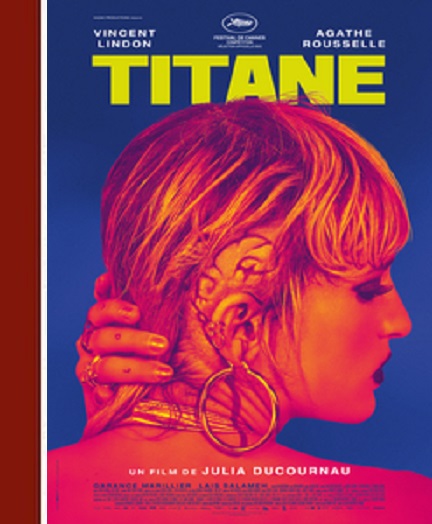

Some fascinating visual techniques are employed in Titane to explore the protagonist’s inner turmoil and physical transformation. It’s directed by Julia Ducournau, who is quickly turning out to be one of the most exciting filmmakers of today, especially in the realm of body horror. This as well as her debut Raw (2016) both explore the complicated, messy dynamics of family in unique and compelling ways.
Story
Titane is about Alexia, a young woman who experiences a traumatic car accident as a child, leaving her with a metal plate in her head. As Alexia grows up, she grapples with the impact of this incident, developing a strange fixation on cars and a tendency towards violent, sexual behaviour. One of the central themes of Titane is Alexia’s rejection of her biological family. After the car crash, she seems to feel her that parents had failed to properly protect her. So Alexia runs away, seeking to build a new “chosen family” that will accept her for who she is, rather than trying to fit into the family she was born into. This is a journey that will surely resonate with many viewers, especially those in the LGBTQ+ community who have had to distance themselves from unaccepting relatives. Alexia’s acts of shocking violence, including stabbing her sexual partners, stem from this deep desire to find belonging and forge her own identity.
Review
Mirrors and reflections play a major role as Alexia struggles to reconcile her outward appearance with her true sense of self. The film’s Gothic, sci-fi-tinged aesthetic reinforces the idea of the human body as something unstable and ever-changing. Through Alexia’s journey, Titane delves into a valid question: are we still “human” if our bodies have become radically altered?
Ducournau isn’t afraid to push boundaries and make audiences uncomfortable as she wrestles with weighty subject matter. Another particularly striking aspect of Titane is the way it links trauma, violence, and sexuality. Alexia’s car accident as a child has clearly left deep scars, manifesting in her strange erotic fixation on automobiles. Even her sexual encounters with human partners involve shocking acts of brutality, as if Alexia can only express intimacy through violence. This unsettling blending of the erotic and the horrific is a trademark of Ducournau’s filmmaking.
She’s unafraid to explore the uglier, more primal sides of human nature and desire. In Titane, this results in some genuinely disturbing yet captivating sequences, like Alexia’s explicit dance routines atop fire trucks. Particularly powerful is the way Ducournau connects Alexia’s violence to the larger societal violence and discrimination often faced by LGBTQ+ individuals. Alexia’s attacks on her sexual partners, both male and female, mirror the senseless acts of hatred directed at queer and trans people in the real world. Titane forces the audience to confront the trauma and rage that can build up when one’s identity is continuously denied or attacked.
Titane is a bold, boundary-pushing work of cinema that further solidifies Ducournau’s reputation as a major talent. Her willingness to tackle complex themes around gender, sexuality, and trauma through the lens of body horror sets her apart from many of her peers. Titane is provocative. At its core, it is a story about the power of finding your own “family,” whether biological or chosen, in the face of trauma and societal rejection. Alexia’s journey may be extreme, but her struggles to define her identity and carve out a space of belonging is thought-provoking and unsettling.

The Gothic, sci-fi-tinged aesthetic reinforces the idea of the human body as something unstable and ever-changing. Through Alexia’s journey, Titane delves into a valid question: are we still “human” if our bodies have become radically altered?
दर्पण और प्रतिबिंब एक प्रमुख भूमिका निभाते हैं क्योंकि एलेक्सिया अपने बाहरी स्वरूप को अपने वास्तविक स्वरूप के साथ सामंजस्य बिठाने के लिए संघर्ष करती है। फिल्म का गॉथिक, विज्ञान-युक्त सौंदर्यबोध मानव शरीर के एक अस्थिर और सदैव परिवर्तनशील होने के विचार को पुष्ट करता है। एलेक्सिया की यात्रा के माध्यम से, टाइटेन एक वैध प्रश्न पर प्रकाश डालता है: क्या हम अभी भी “मानव” हैं यदि हमारे शरीर मौलिक रूप से बदल गए हैं?
डुकोर्नौ सीमाओं को लांघने और दर्शकों को असहज करने से नहीं डरती क्योंकि वह वजनदार विषय वस्तु से जूझती है। टाइटेन का एक और विशेष रूप से उल्लेखनीय पहलू यह है कि यह आघात, हिंसा और कामुकता को कैसे जोड़ता है। एक बच्चे के रूप में एलेक्सिया की कार दुर्घटना ने स्पष्ट रूप से गहरे घाव छोड़े हैं, जो ऑटोमोबाइल के प्रति उसकी अजीब कामुक रुचि में प्रकट होता है। यहां तक कि मानव साझेदारों के साथ उसके यौन संबंधों में क्रूरता के चौंकाने वाले कृत्य शामिल हैं, जैसे कि एलेक्सिया केवल हिंसा के माध्यम से अंतरंगता व्यक्त कर सकती है। कामुक और भयानक का यह अस्थिर मिश्रण डुकोर्नौ के फिल्म निर्माण का एक ट्रेडमार्क है।
वह मानव स्वभाव और इच्छा के कुरूप, अधिक मौलिक पक्षों का पता लगाने से नहीं डरती। टाइटेन में, इसके परिणामस्वरूप कुछ वास्तव में परेशान करने वाले लेकिन मनोरम दृश्य सामने आते हैं, जैसे फायर ट्रकों के ऊपर एलेक्सिया का स्पष्ट नृत्य। विशेष रूप से शक्तिशाली वह तरीका है जिससे डुकोर्नौ एलेक्सिया की हिंसा को एलजीबीटीक्यू+ व्यक्तियों द्वारा अक्सर सामना की जाने वाली बड़ी सामाजिक हिंसा और भेदभाव से जोड़ता है। अपने यौन साझेदारों, पुरुष और महिला दोनों पर एलेक्सिया के हमले, वास्तविक दुनिया में समलैंगिक और ट्रांस लोगों के प्रति घृणा के संवेदनहीन कृत्यों को दर्शाते हैं। टाइटेन दर्शकों को उस आघात और गुस्से का सामना करने के लिए मजबूर करता है जो तब पैदा हो सकता है जब किसी की पहचान को लगातार नकारा जाता है या उस पर हमला किया जाता है।
टाइटेन सिनेमा का एक साहसिक, सीमा-धक्का देने वाला काम है जो एक प्रमुख प्रतिभा के रूप में डुकोर्नौ की प्रतिष्ठा को और मजबूत करता है। लिंग, कामुकता और आघात से जुड़े जटिल विषयों को शारीरिक भय के चश्मे से निपटाने की उसकी इच्छा उसे अपने कई साथियों से अलग करती है। टाइटेन उत्तेजक है. इसके मूल में, यह आघात और सामाजिक अस्वीकृति के बावजूद, अपने स्वयं के “परिवार” को खोजने की शक्ति के बारे में एक कहानी है, चाहे वह जैविक हो या चुना हुआ। एलेक्सिया की यात्रा कठिन हो सकती है, लेकिन अपनी पहचान को परिभाषित करने और अपनेपन की जगह बनाने के लिए उसका संघर्ष विचारोत्तेजक और परेशान करने वाला है।
Mohit Mishra
Prior to studying under noted cinematographer “Kaku” Rajesh Shah, he had passed the written test of the FTII entrance exams on two occasions but succeeded in failing both interviews.
Mohit was a student organiser for the second edition of the Kautik International Film Festival. He is on the verge of making his debut as a filmmaker.

Share Widely

